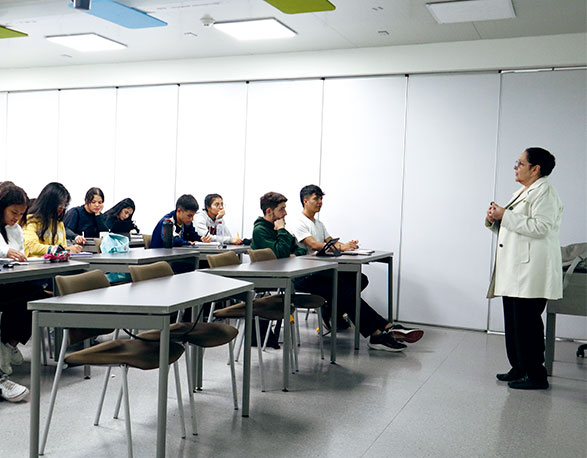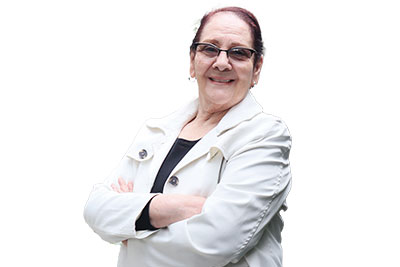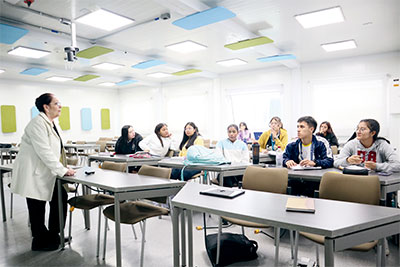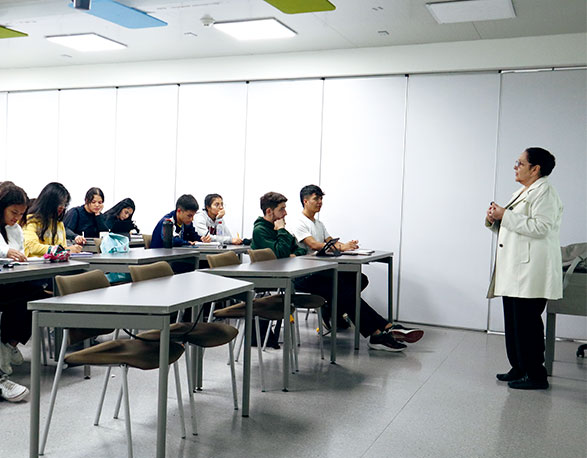Lilia del Riesgo: “Everything can be improved in this world."
By: Magda Páez Torres
Photos: URosario https://doi.org/10.12804/dvcn_10336.42692_num7
Science and Tech

By: Magda Páez Torres
Photos: URosario https://doi.org/10.12804/dvcn_10336.42692_num7
Between the warm lullaby of the island breezes of Havana and the cozy embrace of the eastern hills of Bogotá, the life of the teacher and researcher Lilia del Riesgohas unfolded. She has learned to enjoy the contrasts of the two lands she loves, Cuba and Colombia. The first gave her birth and the tools to train as a professional in the field of medicine; the second has allowed her to build a robust career in academia and research, with a range of achievements that have made her a benchmark for her colleagues and students.
For 18 years, she has been walking the corridors and classrooms of Universidad del Rosario, seeking to sow the seed of knowledge in hundreds of young people who happily nourish themselves from her classes.
“When I arrived in Colombia I felt in a very welcoming environment and I was able to develop in all aspects: in teaching, but also in research. When you emigrate, it feels strange initially, but I always felt very embraced, that makes me very happy,” she says.
The first impact when arriving in a strange land was the intense cold accompanied by the dense clouds that frequently dress the Bogota sky, but as with everything in life, she ended up getting used to it and already feels fully adapted or “flattened”, as they say in Cuba.
Before moving to Colombia she worked as a doctor in Cuba; there she specialized in Clinical Biochemistry and ventured as a researcher in the field of neurosciences. Then came the great leap: she emigrated in 1995 to Bogotá, where she began to work in research, in projects related to nervous system disorders and metabolic diseases of people of different ages. “I like that this specialty I chose has the three main areas: I have been able to dedicate myself to healthcare work with patients, as I did for some time, also research work and teaching,” she says.
And that longing became a reality in Colombia, where she has been able to practice in different areas. She performed her social service in the Unit of Biology of Procreation of the Maternal and Child Institute; there she participated in metabolic studies of newborns and their mothers.
She ventured into teaching at Universidad Nacional and after a year she arrived to Universidad Distrital where she left her mark for almost a decade. By these strange coincidences of life, in 2005 she learned that there was a vacancy at Universidad del Rosario, where the echoes of his good work with students came and gave her the yes to start writing a new story.
“From the beginning it was very satisfying, a very smooth transition,” says the teacher, who has taught biochemistry to medical, rehabilitation and graduate students. At first it was part of the Faculty of Medicine and Health Sciences but later it was linked to the Faculty of Natural Sciences.
In the Méderi University Hospital she continued with the study of metabolic markers of perinatal hypoxia in newborns, a crucial topic in her professional career. But what is the purpose of these studies, and why has Professor Lilia dedicated a significant part of her life to them? In summary, her research helps identify factors that may influence the development of disorders that mothers and newborns have during the perinatal period.
The primary goal is to achieve the survival of the baby and have proper neurodevelopment.
“Biomarkers are molecules, compounds that are detected in blood and that can give us an approximation of the level of neurological damage that the child is suffering. Based on this, a decision can be made so that the child has frequent medical monitoring during the first years and thus achieves the best possible development,” she explains.
One of the health problems that newborns can present is perinatal asphyxia, aggression caused to the fetus or the newborn by the lack of oxygen and/or the lack of an adequate tissue perfusion (definition of the Therapeutic Diagnostic Protocols of the Spanish Pediatric Association) very common at that stage of life. “The child can suffer metabolic alterations due to a decrease in oxygen supply at the time of delivery, which can cause neurological damage that sometimes manifests itself in their school stage,” she notes.
Currently, Professor Lilia intends to investigate, together with the team of the Méderi University Hospital, the impact of Covid-19 on pregnant women who suffered from the disease, how it manifested in children and whether complications occurred in the perinatal period (from 2020 to date).
She emphasizes that research is essential for humanity; that is why she insists on the need to expand knowledge about the great problems that prevail in a society.
“There are many environmental factors that are permanently affecting the development of populations: migration, displacement, poverty and its consequences, malnutrition or malnutrition. All of this impacts the progress of society. That is why we need to start with research at all levels. We have to do a multidisciplinary study that covers all aspects,” he emphasizes.
Her work is widely recognized by her colleagues. Professor Alejandro Ondo, who considers her a mentor, attests to this. He shares that when he came to work at Universidad del Rosario and faced the challenge of teaching biochemistry to medical students, being a biologist by profession, “Teacher Lilia” helped him identify his teaching potential and adjust his knowledge to the needs of students. “She is a person who is always willing to collaborate; who is curious and creative, and who is constantly considering how the work we do at the teaching and research level can be improved.”
In this way, she has earned the respect of an entire academic community that recognizes the valuable contribution of the outstanding and beloved teacher during that path worked at Universidad del Rosario.

Lilia del Riesgo Prendes, professor in the School of Medicine and Health Sciences, Universidad del Rosario.
“The teacher is always motivated”
Throughout that time, Professor Lilia has enjoyed the appreciation and recognition of her students, who, in return for her teaching and dedication in classes, have repeatedly chosen her as one of the best teachers in the Faculty. The secret: “The teacher is always motivated,” she sums it up herself.
Not surprisingly, she has received several awards for his pedagogical work in Colombia: Juan Agustín Uricoechea y Navarro Teaching Excellence Award 2011; Distinguished Professor at Universidad del Rosario 2010; Recognition of Academic Excellence for the evaluation of teaching performance from the first semester of 2003 to the first semester of 2005; and Recognition of the Scientific and Investigative Work of the teachers of the School of Medicine and Health Sciences, among others.
In addition to her clinical research, she has devoted much of his time to improving pedagogical models, working hard on methodological improvement.
“The work with the students gratifies me enormously, more than anything else. This close relationship that I establish with them contributes a lot to improving the learning strategy and teaching methods,” she says.
As Professor Ondo says, she is a person who is always considering what the student needs to learn according to their professional profile and the disciplinary area they have chosen, to adapt the classes to these needs. “I think she does a very outstanding teaching job to get students to identify and value the importance of biochemistry in the professional field they have chosen for their future.”

“When I arrived in Colombia I felt in
a very welcoming environment and I
was able to develop in all aspects: in
teaching, but also in research. When
you emigrate you feel strange initially,
but I always felt very embraced; that
makes me very happy.”
And he adds that for that and much more the students profess enormous respect and affection. “They see her as a very warm, approachable person whom they can rely on, someone for whom they easily develop fondness and empathy. She has fought hard to make biochemistry a course that is taught with love and that students find their taste and learn it also with love,” she adds.
And that affection is clearly mutual, as the researcher shows, who expresses that the students with whom she interacts daily manage to transmit all their vitality and enthusiasm. “They are young people, with their whole lives in their eyes and in their hearts. That inspires you a lot.”
A Physician by Conviction
Although she was born in one of the epicenters of medicine in the region, Professor Lilia confesses that her choice was one of conviction. “I studied medicine for a very personal motivation. It is an inclination I had since I was a child, and thank God I've been able to walk this path. I am fortunate because I studied the career that I like and I have developed my whole life and my profession in that career,” she says enthusiastically.
Today, from the classrooms of Universidad del Rosario, she looks back with gratitude and continues to see the future with hope. Now she is not only a doctor by conviction dedicated to her professional mission, but also a complete part of Universidad del Rosario in every sense of the word: “I have been very honored since the first day I set foot here. The atmosphere is very familiar, supportive; it makes you feel at home. And when you sit in the house, you feel good. That is the spirit of the University at all venues and at all levels. You do not feel any different with the directives or with your close classmates, or with the students... with anyone. Everyone is in an attitude of great collaboration, of finding solutions,” she emphasizes.
It should also be noted that she is Colombian, not only legally, but also with heart and soul; an island and Andean woman, who is debated before two nostalgias: “When I'm in Cuba I miss the dynamism of Bogotá much more than I miss Havana being here. However, here I always remember Havana a lot. It is a mixture of sensations that has enriched my spirituality.”

"Working with students greatly fulfills
me, more than anything else. The
close relationship I establish with them
contributes significantly to improving
the learning strategy and teaching
methods."
However, there is something that no one will ever be able to get out of his DNA: her love for the sea, the memory of the port of her hometown, where she watched daily the playfulness of the waves. “I missed that a lot, and I still miss it, because when you’re an islander, it’s hard to start getting used to the mainland.”
And although Bogotá has no sea, it has given her a career full of gratification and satisfaction. She knows that, like the waves, life is in constant motion and, in the end, she will always be able to visit Cuba when the soul longs for the soft singing of the warm waters of the Caribbean. Therefore, once a year, she tries to return to her roots.
Her personality could also be considered a mixture of both places. Although she considers herself demanding, responsible and disciplined in all aspects of her life, an enthusiastic spirit emerges in her. “I see things from a good point of view, with that face with which I think you have to see things in life. Enjoy all the moments. The everyday is what fills you the most. If one is living with all the fullness and possibilities, age is a secondary issue.”
This is corroborated by Professor Alejandro Ondo: “She is a cheerful person, who, in general, always seeks to see the best of every moment and be in a good disposition. She is a very tender woman, with a strong vocation of mom, that is why she is always aware and in the care of other people.”
Professor Lilia is convinced that “everything can be improved in this world”, that nothing is completely done. This is why she cares every day, not only about being a better person, but also about improving her pedagogical and investigative work.
For this reason she continues to travel between the classrooms and clinics, where she has been able to weave his dreams and contribute a great fee to improve the quality of life of patients; where she has been able to pay for the vocation of her students; where she has managed to build bonds with colleagues who admire and honor her legacy; where she has left an indelible imprint of love for knowledge.